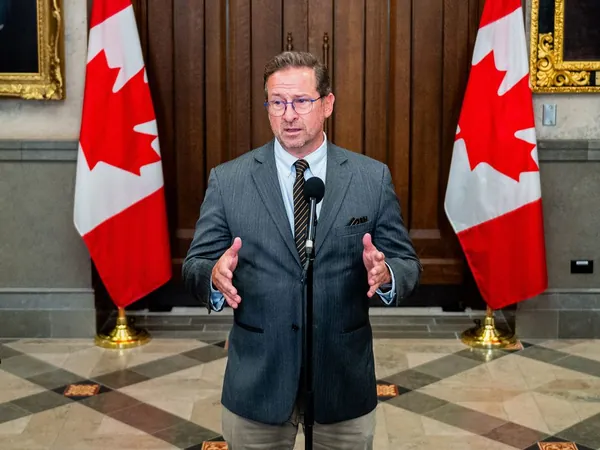
Al Gore's Climate Database Faces Criticism for Underreporting Emissions—Are We in Danger?
2024-10-09
Author: Noah
A Startling Revelation from Northern Arizona University
A startling new study from Northern Arizona University (NAU) has revealed that the Climate TRACE database, co-founded by former Vice President Al Gore, might be gravely underestimating greenhouse gas emissions from power plants—by a staggering 50% on average. This troubling conclusion raises urgent questions about the reliability of data that is critical to our fight against climate change.
The Investigation by Professor Kevin Gurney
Professor Kevin Gurney, a leading researcher in atmospheric science at NAU, conducted a detailed analysis of the carbon dioxide emissions reported in the Climate TRACE database. His research highlights that accurate greenhouse gas data is fundamental for effective climate policy and action. Unfortunately, Gurney's findings suggest that Climate TRACE's methods are far less precise than necessary.
The Role of AI in Emissions Reporting
During his investigation, Gurney noted the limited use of advanced artificial intelligence methods in the database's estimations, with only 4% of U.S. facilities employing AI techniques. The remaining 96% relied on more rudimentary methods, which accounted for the significant discrepancies observed in emissions reporting.
Comparison with the Vulcan-Power Database
To validate his findings, Gurney and his team compared Climate TRACE’s data with their own comprehensive emissions database, known as "Vulcan-power." This project is meticulously calibrated against multiple authoritative datasets from the Environmental Protection Agency and the Department of Energy. What Gurney found was alarming: the CO2 emissions reported by Climate TRACE were, on average, 50% lower than those logged in the Vulcan-power database.
Implications for Policymakers
Co-investigator Pawlok Dass pointed out, “While the Vulcan-power data has about 15% uncertainty, this pales in comparison to the differences we uncovered when juxtaposing the Climate TRACE figures.” The inaccuracies in the Climate TRACE data could have significant implications for policymakers. The urgency is now to establish better standards and scientific methodologies for estimating greenhouse gas emissions, which is crucial for crafting effective climate policies and allocating funding towards effective emission reduction strategies.
The Need for Accurate Data in Climate Policy
Ph.D. student Bilal Aslam emphasized that improving data accuracy would ensure that policymakers make the most informed decisions when allocating public funds aimed at mitigating climate change. 'Our goal is to enhance the effectiveness of policies and target funding more accurately,' he stated.
Gurney's Call for Higher Standards
“We will never achieve perfect accuracy in emissions estimation,” Gurney cautioned. “However, we must guarantee that the data shared with lawmakers and the public adhere to the highest scientific standards available.”
Gurney's Expertise and Contributions
Gurney is no stranger to the complexities of climate research. Over the last two decades, he has pioneered a standardized system for quantifying greenhouse gas emissions across the U.S. His groundbreaking projects—Vulcan and Hestia—offer detailed insights into emissions down to specific power plants, neighborhoods, and roads. This level of precision aids in identifying hotspots that require urgent action to cut emissions effectively.
A Call to Action in Climate Research
His methods have consistently shown strong agreement with direct atmospheric monitoring data. With over 160 scientific publications to his name, Gurney has also contributed to pivotal reports like the U.S. National Academy Report on greenhouse gases for decision-making. He has played a crucial role in international climate agreements for more than 25 years, including the United Nations Climate Change Framework Convention and the Kyoto Protocol, as a lead author for the Intergovernmental Panel on Climate Change (IPCC).
Conclusion: The Urgent Need for Change
This revelation about the Climate TRACE database should serve as a wake-up call. As the clock ticks on climate action, we need to ensure that the information guiding our decisions is not just good—but spot-on. Without precise data, our collective efforts may be futile. Are we inadvertently jeopardizing our chances against climate change by relying on flawed figures? It's time for rigorous scrutiny and reform in how emissions are reported.









 Brasil (PT)
Brasil (PT)
 Canada (EN)
Canada (EN)
 Chile (ES)
Chile (ES)
 España (ES)
España (ES)
 France (FR)
France (FR)
 Hong Kong (EN)
Hong Kong (EN)
 Italia (IT)
Italia (IT)
 日本 (JA)
日本 (JA)
 Magyarország (HU)
Magyarország (HU)
 Norge (NO)
Norge (NO)
 Polska (PL)
Polska (PL)
 Schweiz (DE)
Schweiz (DE)
 Singapore (EN)
Singapore (EN)
 Sverige (SV)
Sverige (SV)
 Suomi (FI)
Suomi (FI)
 Türkiye (TR)
Türkiye (TR)